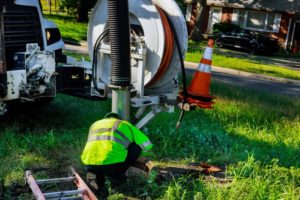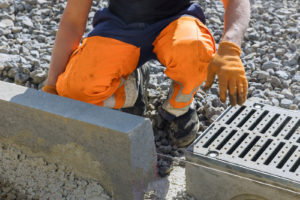Stormwater reaches the ground in the form of rain, hail, sleet, and snowmelt. Stormwater is largely absorbed into the ground where it replenishes the drinking and groundwater supply, provides nourishment to plants and animals, and is critical in maintaining healthy green ecosystems.
Whether or not you realize it, storm drains play a crucial role in keeping your landscaping looking beautiful, your basement dry, and preventing damage to your foundation.
After a storm or particularly heavy rains, debris, sediment, and foreign material normally clogs drain outlets. If not removed, debris such as logs and soil can cause a total blockage of drains and even damage the drain itself.
The Purpose of Stormwater Drains
The primary purpose of a storm drain network is to protect communities from floods. This is done by channeling excess rain discharge away from roads, buildings, and other structures. If a storm drain becomes damaged or clogged, it won’t be able to perform this intended function.
Storm drains are designed to prevent flooding on the road, in yards, and around homes and commercial facilities. They work by diverting rainwater and melting snow and ice into nearby waters. Every time it rains, rain runs off of your roof, through your gutters, and into the street.
Site Drainage
Most properties, be it a house, an office block, a farm or an industrial facilities needs to be able to deal with the rainfall landing on-site. This typically requires channeling it effectively into the local drainage so that excess waterflow can run effectively, and does not cause flooding or runoff into neighboring properties.
Components of site storm drain systems include gutters, hard surfaces, soft landscaping, rain gardens, underground storage tanks, and above-ground storage basins.
What are Stormwater Inspections?
Stormwater inspections is a crucial part of keeping storm systems operating at optimal levels. Do you know what kind of shape your storm and sanitary drains are in today? Imagine your building flooding and then stopping to think to yourself, this could have been prevented. If you have ever been through a storm drain flood, you know it’s unlike any other emergency, because Mother Nature controls the flow, and she says when it stops. If you don’t know the state of your drain, now is the time to schedule an inspection.
Scheduling storm drain inspections regularly helps keep your storm drains fully functional and ready to take on the stormwater flow. A stormwater drain inspection reviews the stormwater drainage system where the inspector inspects stormwater discharge at a property and will prepare an inspection report.
Types of Inspections
There are usually three types of inspections. Two out of the three can be scheduled, and the last we hope to never experience, an emergency. But do not panic yet, this one can often be prevented with conducting an inspection. Let’s continue to look at the most typical stormwater inspections.
- New Construction Site – This inspection is usually done after construction has ended at the site with a new installation and helps identify any debris or sediment that has accumulated in the system during the construction phase. As well as inspecting that the build is in compliance of regulations.
- Routine Maintenance – A routing maintenance inspection should be at a minimum an annual inspection and can help determine the stormwater sewer system’s integrity, including inspecting if a break or cracks are present, roots, foreign debris build-up, washouts, and collapsed lines. This by far is the most critical inspection for preventing the third inspection.
- An emergency – Similar to the routine maintenance, only now it has probably caused flooding and property damage.
Learn Why Inspections Are Needed
There are many reasons to regularly inspect and have routine maintenance of your stormwater system. If you maintain your stormwater system, you will help protect downstream water quality and habitat for wildlife and people to enjoy. In addition to maintaining quality, well-maintained stormwater facilities will help protect downstream residents from potential flood or erosion damage. A little bit of maintenance goes a long way.
Save on Repairs Down the Road
Another convincing reason to have routine stormwater inspections is to be aware of any storm drain maintenance issues so that repairs can be made while potential issues are still relatively minor and can be easily fixed. If you keep up with some simple tasks, you may avoid having to pay for expensive repairs in the future.
Public Safety
Storm drain inspections can alert you if you need to have any storm drain repair done. In a worst-case scenario, a faulty storm drain with neglected repairs can endanger lives and expose people to health risks related to stormwater flooding. It’s never a good idea to put off an inspection. This is one type of quality check that could well turn out to be crucial. You don’t want to be the one accused later of cutting corners when the health of your community may be involved.
Signals a Storm Drain Inspect is Needed
Stormwater drains are an essential part of a property’s flood prevention system. They drain excess rainwater away from your property before it can cause any problems. But most people fail to recognize the signs that they have drain problems before it is too late. Let’s take a look at an example or two of some things to look for that could be signals you need an inspection.
Water Stains
Traces of water on your home’s foundation or in your basement show that water from your yard or property has escaped. If these stains are high up on the foundation wall, this points to a drainage issue outside your property. The normal cause of this is poor drainage from your storm drains. If you see stains like this in your basement, clear your basement of anything valuable and schedule a storm drain inspection ASAP!
Standing Puddles in Your Yard
After long periods of rain, you’ll often see puddles on your lawn for a few hours. But if those puddles stay more than a few hours, then you could have a problem with your drains. An easy way to check is to compare your yard with your neighbors’. If your yard stays filled up but your neighbor’s yard dries out, then you have a drainage issue.
Slow Drain Gutters
Over time, debris can build up in your storm drains. If it isn’t tackled, it can reduce rain flow efficiency. This reduced flow can see water back up in your gutters. This can be very damaging to your property. If it gets to the point where gutters overflow, it can rot siding, peel paint jobs, and cause structural issues. Proper maintenance helps maintain your gutter system.
Mold
If water starts to get into your property, then mold will soon follow. Many building materials are prone to mold growth once they become waterlogged. It may start with an odor in your basement after heavy rainfall, becoming persistent over time. Before long, you will have black mold growth in your basement, which if left unchecked will spread to the rest of your house. Protect your home and health today by getting your storm drains inspected.
Correct the Issues – Proper Maintenance
Ongoing, regular maintenance activities are different from inspection. Regular, ongoing maintenance should include activities such as removing trash and sediment from the streets, raking and picking up leaves from lawns, and place yard waste and compost out of the path of drainage ways. In many cases, this added clean up will help ensure your drainage system will work properly when needed.
Call the Stormwater Facilities Experts
As you can see, there are a few signs to recognize that may lead to drain problems you need to watch out for. They range from mild problems like slow drainage to more drastic issues like mold and sinkholes. If you see any of these signs, you should get your storm drains inspected before the problem gets worse.
Like our sewer system inspections, our inspectors handle storm drains and other storm systems to ensure they are functioning correctly without any underlying issues. Disregarding regular stormwater drain inspections is unwise due to the consequences you may face after a severe storm.
Our Stormwater Inspection Services
This routine inspection can identify areas that may soon lead to a propensity for leaking pollutants, and a number of other concerns. If you are ready to schedule your inspection, we are ready to accommodate you. Our experts at Delaware Valley Septic, Sewer & Storm are trusted sources for all your septic, sewer & storm water systems in Chester County, Delaware County, Montgomery County, and all throughout the Delaware Valley area, and are professionals held to the highest standards. Contact us today.




